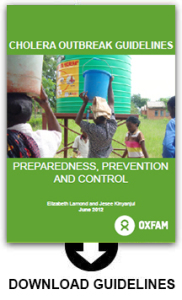Oxfam’s Cholera Outbreak Guidelines were developed as an internal resource, but today we are sharing them externally in order to seek input from the international humanitarian community. We hope that this feedback will inform later editions in order to develop a powerful resource for anyone looking to prepare for, prevent and control a cholera outbreak. Here, one of the authors of the Guideline, Bibi Lamond, explains more. 
I have been responsible for implementing and coordinating cholera outbreak programmes since 2006. In my work I have found that, although there are numerous documents and books on medical intervention for cholera control, there are no comprehensive water, sanitation and hygiene promotion (WASH) guidelines.
Oxfam’s new publication, the Cholera Outbreak Guidelines aims to meet this need and could set standards for other emergency WASH actors.
The content of the Guidelines has evolved from firsthand field experience in Oxfam’s emergency cholera programmes in Haiti, Democratic Republic of Congo, Ethiopia and Zimbabwe. It has also drawn on information from other NGOs, such as Médecins Sans Frontières, renowned for their cholera work in the field.
We all know that rapid interventions are essential at the onset of a cholera outbreak to reduce preventable deaths. But, prior to the launch of these Guidelines, Oxfam WASH teams had no standardised way of designing cholera control activities. When Programme Managers asked for evidence of effective activities, WASH teams struggled. In terms of budget and staff numbers, cholera control programmes were often under-resourced from the very beginning due to a lack of guidance or lessons learned from past cholera programmes.
The new publication offers clear information for ensuring effective resources as soon as a cholera outbreak is reported. It aims to cover everything a health promoter, sanitation engineer, water engineer or programme manager will need to have at their finger tips to start up an effective WASH control programme with minimum delay.
It is packed with practical information hard-won from the field covering everything from the gender split of programme staff, to how to prevent cholera transmission at funerals, to what to do if someone has swallowed chlorine.
But Oxfam is not claiming to know all the answers. We are inviting comments, suggestions, new ideas and advice from our humanitarian colleagues from agencies around the world.
The Guidelines are available to download in English, French and Spanish.



